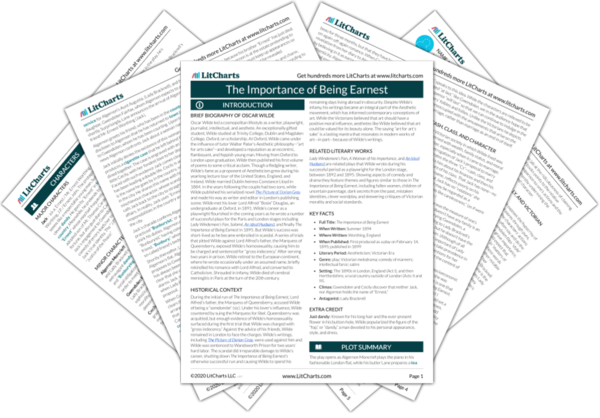The Art of Deception: Fact v. Fiction
As a leader of the Aesthetic movement, Wilde was especially interested in the relationship between life and art, pondering the eternal question, “Does art imitate life, or life imitate art?” Wilde explores this relationship in The Importance of Being Earnest through the conflict that arises when fact collides with fiction. The conflict between fact and fiction is driven by Algernon and Jack’s lies about their respective identities, specifically the fictional personas they create in order…
read analysis of The Art of Deception: Fact v. FictionThe Pursuit of Marriage
The pursuit of marriage is a driving force behind much of the play’s action. Similar to many Victorian novels of the period, the play reads as a marriage plot, documenting the errors in social etiquette and romantic upheavals that come about as Jack and Algernon stumble towards the altar. Jack pursues Gwendolen’s hand, while Algernon pursues Cecily. Because Jack and Algernon are willing to go to such outlandish lengths to appease Gwendolen and Cecily’s…
read analysis of The Pursuit of MarriageCash, Class, and Character
The Victorian society in which Wilde lived was concerned with wealth, family status, and moral character, especially when it came to marriage. Lady Bracknell’s interrogation of Jack’s proposal to marry Gwendolen demonstrates the three “Cs”—cash, class, and character. First she asks him about his finances and then his family relations, a measure of his class. That Jack has none—no family relations, or family name, reflects poorly on his character. Upon finding that Jack has no…
read analysis of Cash, Class, and Character
Name and Identity
Through Jack’s search for his origins and family name, Wilde satirizes the Victorian Era’s intense scrutiny of cash, class, and character. Wilde subversively prods this question through the name of “Ernest,” a Christian name, or given name, as opposed to a family name. The name of “Ernest” comes to symbolize different things for different people. For Gwendolen and Cecily it “inspires absolute confidence” but also symbolizes the ideal husband/ lover. For Jack, “Ernest”…
read analysis of Name and IdentityHypocrisy, Folly, and Victorian Morality
A witty wordsmith, Wilde exposes the hypocrisy of the Victorians’ strict social mores through puns, paradoxes, epigrams, and inversions in the characters’ actions and dialogue. For instance the characters often say and do the opposite of what they mean, or intend. Gwendolen flips “style” and “sincerity” when she says, “In matters of grave importance, style, not sincerity is the vital thing.” One would expect that “sincerity” should take precedence over “style” in “matters of grave…
read analysis of Hypocrisy, Folly, and Victorian MoralityMen and Women in Love
In the game of love that Wilde plays throughout The Importance of Being Earnest, Jack and Algernon, who strive for love, are pitted against the fickleness of the women they desire. Even though Wilde assigns stereotypical gender roles to each sex—Jack and Algernon are suave dandies, while Cecily and Gwendolen are vapid beauties—when it comes to marriage and love, he places women in a position of power because they are able to…
read analysis of Men and Women in Love






